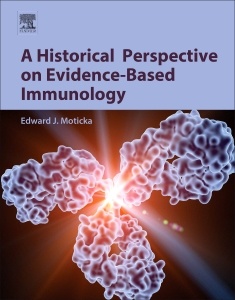A Historical Perspective on Evidence-Based Immunology
Auteur : Moticka Edward J.

A Historical Perspective on Evidence-Based Immunology focuses on the results of hypothesis-driven, controlled scientific experiments that have led to the current understanding of immunological principles. The text helps beginning students in biomedical disciplines understand the basis of immunologic knowledge, while also helping more advanced students gain further insights.
The book serves as a crucial reference for researchers studying the evolution of ideas and scientific methods, including fundamental insights on immunologic tolerance, interactions of lymphocytes with antigen TCR and BCR, the generation of diversity and mechanism of tolerance of T cells and B cells, the first cytokines, the concept of autoimmunity, the identification of NK cells as a unique cell type, the structure of antibody molecules and identification of Fab and Fc regions, and dendritic cells.
1. Innate Host Defense Mechanisms and Adaptive2. Hallmarks of the Adaptive Immune Responses3. Two Effector Mechanisms of the Adaptive Immune Response4. The Small Lymphocyte Is the Antigen Reactive Cell5. Lymphocytes Transform into Plasma Cells and Produce Antibodies6. The Clonal Selection Theory of Antibody Formation7. Plasma Cells Produce Antibody of a Single Specificity8. Self–Non-self Discrimination: How the Immune System Avoids Self-Destruction9. The Thymus in Lymphocyte Maturation10. The Bursa of Fabricius in Lymphocyte Maturation11. Revealing the Structure of the Immunoglobulin Molecule12. Complement13. Antibody Production Requires Thymus-Derived and Bone Marrow (Bursa)-Derived Lymphocyte Interactions14. Cell Collaboration in the Antibody Response: Role of Adherent Cells15. Recognition Structures on Cells of the Innate Host Defense Mechanisms16. The Adaptive Immune Response and Histocompatibility Genes17. Interaction of Lymphocytes with Antigen: Identification of Antigen-Specific Receptors18. Generation of Diversity in the Adaptive Immune Response19. B Lymphocyte Activation20. Activation of T Lymphocytes and MHC Restriction21. Development of Tolerance to Self in B Lymphocytes22. Development of Tolerance to Self in T Lymphocytes23. T Lymphocyte Subpopulations24. T Lymphocyte Control of the Immune Response:From TS to TREG25. Intercellular Communication in the Immune System26. Antibody-Mediated Effector Mechanisms27. T-Lymphocyte-Mediated Effector Mechanisms28. Lymphocytes that Kill: Natural Killer (NK) and Natural Killer T (NKT) Lymphocytes29. Role of Dendritic Cells in the Adaptive Immune Response30. The Mucosal Immune System and Secretory IgA31. Disorders of the Innate Host Defenses32. Defects in the Adaptive Immune Response Leading to Recurrent Infections33. Pathologies Resulting from Aberrant Immune Responses34. Immune Responses Directed Against Self35. Lymphoproliferative Diseases36. Transplantation Immunology37. Tumor Immunology38. Therapies that Manipulate Host Defense Mechanisms39. Techniques to Detect and Quantify Host Defenses40. The Future of Immunology
He has taught immunology to medical and graduate student for more than 40 years. Currently he is responsible for all the immunology didactic teaching for first and second year medical students at the School of Osteopathic Medicine.
He has been a member of the American Association of Immunologists since 1976, and an Adjunct Professor in the Biodesign Institute and the School of Life Sciences at Arizona State University since 2005. In addition to teaching and research, Dr. Moticka is an expert in the area of research management including research compliance issues relating to human and animal subjects protection and technology transfer
- Provides a complete review of the hypothesis-driven, controlled scientific experiments that have led to our current understanding of immunological principles
- Explains the types of experiments that were performed and how the interpretation of the experiments altered the understanding of immunology
- Presents concepts such as the division of lymphocytes into functionally different populations in their historical context
- Includes fundamental insights on immunologic tolerance, interactions of lymphocytes with antigen TCR and BCR, and the generation of diversity and mechanism of tolerance of T and B cells
Date de parution : 12-2015
Ouvrage de 394 p.
21.4x27.6 cm



